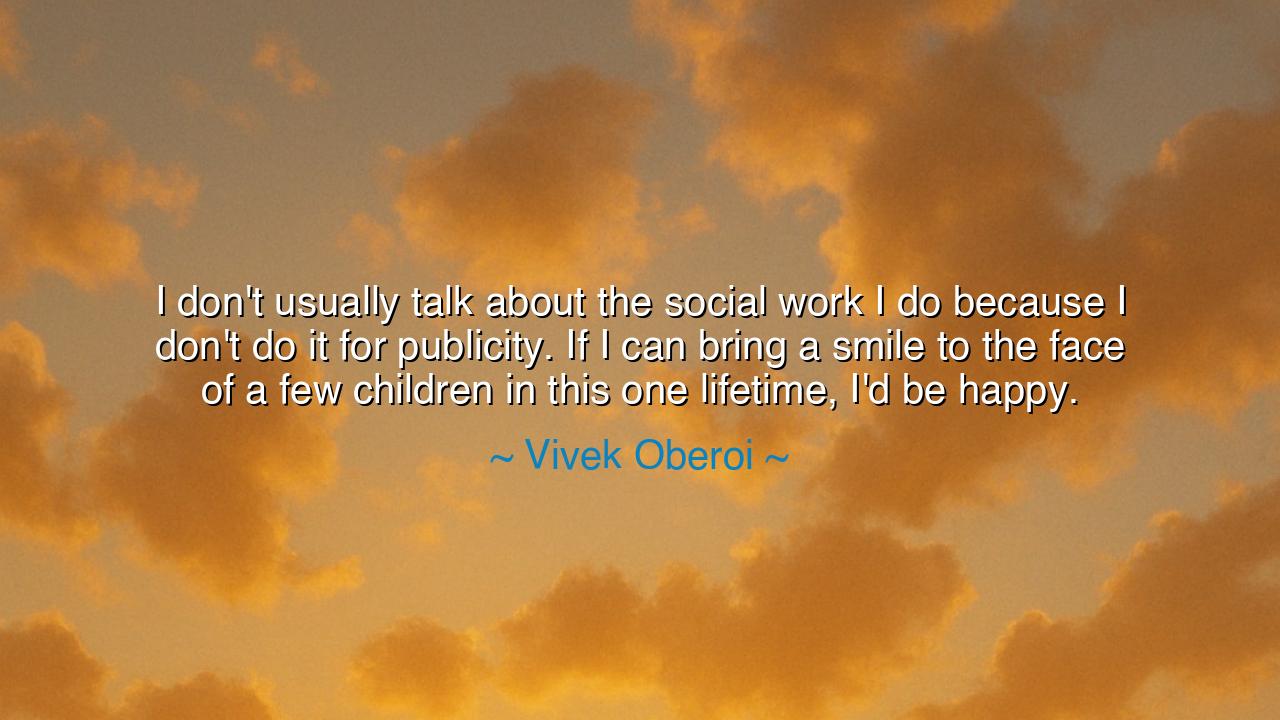
I don't usually talk about the social work I do because I don't
I don't usually talk about the social work I do because I don't do it for publicity. If I can bring a smile to the face of a few children in this one lifetime, I'd be happy.






Vivek Oberoi, a man who has tasted fame yet speaks here with humility, once said: “I don’t usually talk about the social work I do because I don’t do it for publicity. If I can bring a smile to the face of a few children in this one lifetime, I’d be happy.” These words are not the boast of one seeking applause, but the quiet confession of a soul who understands that true service is not performed in the glare of recognition but in the silence of compassion. He reminds us that the highest acts of goodness are those done not to be seen, but to bring light into the lives of others.
The ancients held this principle in reverence. In the teachings of the Bhagavad Gita, Krishna instructs Arjuna to perform his duty without attachment to reward or recognition, for the work itself, when done selflessly, becomes sacred. So too in the Gospel of Matthew, Christ taught his followers not to trumpet their charity before men, but to give in secret, “and your Father who sees in secret will reward you.” Oberoi’s words, though modern, stand firmly in this lineage of timeless wisdom: that to serve without expectation is the purest form of virtue.
The smile of a child is, in truth, one of the greatest treasures a human being can create in the world. It is untainted by cynicism, free from calculation, and filled with innocence. To give a child reason to smile is to plant joy in the soil of the future, for that smile will ripple outward, shaping the adult they become and the world they will help create. History bears witness to this: when Mother Teresa walked the streets of Calcutta, it was not the grandeur of her actions that shook the world, but the countless children whose faces she lifted with her care, whose smiles became the living testimony of her life’s mission.
Oberoi’s choice to remain silent about his social work is itself an act of strength. In an age where fame clamors for constant display and where many serve with cameras watching, he points instead to a nobler path—the path of the unheralded servant, who finds his joy not in headlines but in the quiet satisfaction of seeing others healed. Such humility was the mark of true heroes throughout history. Consider Marcus Aurelius, emperor of Rome, who wrote in his Meditations that a good deed is not diminished when unrecognized, for its value lies in the act itself, not in the witness.
Mark this well: when Oberoi says, “If I can bring a smile to the face of a few children, I’d be happy,” he reveals a truth that humbles the pride of kings. For no palace, no conquest, no mountain of wealth can match the simple power of restoring joy to a suffering heart. In the economy of eternity, such smiles are more valuable than all the riches of the earth. They are offerings that endure when monuments crumble and fame fades to dust.
Practical wisdom flows from these words: seek to serve in ways unseen. Do not measure your worth by applause or recognition. Instead, measure it by the quiet joy you bring to others—the moments when a weary soul is lifted, when a child laughs, when a stranger finds comfort because of you. These are the treasures that cannot be stolen, the victories that will not fade.
Therefore, O seeker, let Vivek Oberoi’s words guide your path. Live not for publicity, but for purpose. Let your acts of compassion be the seeds you sow into the lives of others. And if in this one brief lifetime you can bring a smile to even a few faces, know that you have fulfilled a calling higher than fame, greater than riches, and eternal in its worth. For in every smile born of your kindness, the universe itself is made brighter.






AAdministratorAdministrator
Welcome, honored guests. Please leave a comment, we will respond soon